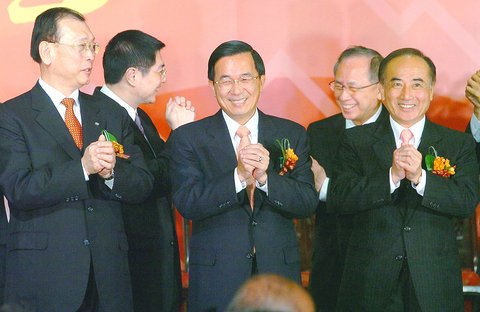President Chen Shui-bian (陳水扁) has instructed the National Security Council (NSC) to study the feasibility of abolishing the National Unification Council and unification guidelines, Legislative Speaker Wang Jin-pyng (王金平) said yesterday.
"Whether or not to scrap the National Unification Council is an issue that the president has the authority to decide, but the abrogation of the guidelines must be approved by the Executive Yuan because they were originally given the go-ahead by the executive branch," Wang said.
"Whether it is fitting to nullify the council and guidelines is an issue under careful study by the National Security Council," he said.

PHOTO: LIU HSIN-DE, TAIPEI TIMES
Wang made the remarks yesterday afternoon after meeting with the president at the Presidential Office to brief Chen about his attendance at the inauguration of Honduran President Manuel Zelaya and other issues.
Wang attended Zelaya's inauguration on behalf of Chen.
Before the meeting, Wang told reporters that "it would be great" if the Presidential Office could reiterate the "four noes and one without" pledge that Chen made in his 2000 inauguration speech in an attempt to deal with the unification council and guidelines.
The "four noes and one without" refer to not declaring independence; not changing the title "Republic of China;" not enshrining in the Constitution former president Lee Teng-hui's (李登輝) conception of cross-strait relations as "state-to-state" in nature; and not endorsing a referendum on independence.
Wang told reporters after the meeting that Chen had instructed the NSC to study whether reiterating the "four noes and one without" vow was prudent.
Meanwhile, Minister of Foreign Affairs James Huang (
"Our communication with the US government has been sincere and friendly," Huang said. "It is not as bad as the media portray, which is exactly what our opponent wants -- the media spreading information on this topic without concrete sources."
A local Chinese-language newspaper reported that Washington has not ruled out publicly criticizing Chen during Chinese President Hu Jintao's (
Speaking on the long-stalled arms procurement budget, Wang indicated it was not important what Chen says about the issue because the bill remains in the hands of the legislature.
"What matters here is the opinions of the opposition parties," Wang said. "The matter will be settled via democratic means and the public, including the ruling party and the president, as well as the US government, must respect and accept the legislature's final decision."
Wang, however, called on opposition parties to take into account China's aggressive military buildup.
"China will not stop development of its military even if we don't buy any weapons," Wang said. "We have to acknowledge the fact that the military imbalance across the Taiwan Strait is bound to drastically increase if we don't strengthen our self-defense capabilities."
Earlier in the day, Wang said that it did not sound right that the opposition parties would present their own arms procurement shopping list.
The Chinese Nationalist Party (KMT) is planning to propose its own version of the special arms-procurement bill by the end of the month after KMT Chairman Ma Ying-jeou (

Taiwan yesterday denied Chinese allegations that its military was behind a cyberattack on a technology company in Guangzhou, after city authorities issued warrants for 20 suspects. The Guangzhou Municipal Public Security Bureau earlier yesterday issued warrants for 20 people it identified as members of the Information, Communications and Electronic Force Command (ICEFCOM). The bureau alleged they were behind a May 20 cyberattack targeting the backend system of a self-service facility at the company. “ICEFCOM, under Taiwan’s ruling Democratic Progressive Party, directed the illegal attack,” the warrant says. The bureau placed a bounty of 10,000 yuan (US$1,392) on each of the 20 people named in

The High Court yesterday found a New Taipei City woman guilty of charges related to helping Beijing secure surrender agreements from military service members. Lee Huei-hsin (李慧馨) was sentenced to six years and eight months in prison for breaching the National Security Act (國家安全法), making illegal compacts with government employees and bribery, the court said. The verdict is final. Lee, the manager of a temple in the city’s Lujhou District (蘆洲), was accused of arranging for eight service members to make surrender pledges to the Chinese People’s Liberation Army in exchange for money, the court said. The pledges, which required them to provide identification

Nine retired generals from Taiwan, Japan and the US have been invited to participate in a tabletop exercise hosted by the Taipei School of Economics and Political Science Foundation tomorrow and Wednesday that simulates a potential Chinese invasion of Taiwan in 2030, the foundation said yesterday. The five retired Taiwanese generals would include retired admiral Lee Hsi-min (李喜明), joined by retired US Navy admiral Michael Mullen and former chief of staff of the Japan Self-Defense Forces general Shigeru Iwasaki, it said. The simulation aims to offer strategic insights into regional security and peace in the Taiwan Strait, it added. Foundation chair Huang Huang-hsiung

’DISTORTION’: Beijing’s assertion that the US agreed with its position on Taiwan is a recurring tactic it uses to falsely reinforce its sovereignty claims, MOFA said The Ministry of Foreign Affairs (MOFA) yesterday said Chinese state media deliberately distorted Taiwan’s sovereign status, following reports that US President Donald Trump agreed to uphold the “one China” policy in a phone call with Chinese President Xi Jinping (習近平). During the more than one-hour-long call, Xi urged Trump to retreat from trade measures that roiled the global economy and cautioned him against threatening steps on Taiwan, a Chinese government summary of the call said. China’s official Xinhua news agency quoted Xi as saying that the US should handle the Taiwan issue cautiously and avoid the two countries being drawn into dangerous